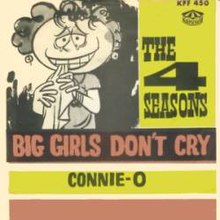Big Girls Don't Cry (The Four Seasons song)
| "Big Girls Don't Cry" | ||||
|---|---|---|---|---|
 | ||||
| Single by The Four Seasons | ||||
| from the album Sherry & 11 Others | ||||
| B-side | "Connie-O" (non-LP track later included on Golden Hits of the 4 Seasons album) | |||
| Released | October 1962 | |||
| Recorded | September 1962 | |||
| Genre | Rock, doo-wop, brill building | |||
| Length | 2:26 | |||
| Label | Vee-Jay | |||
| Songwriter(s) | Bob Crewe, Bob Gaudio | |||
| Producer(s) | Bob Crewe | |||
| The Four Seasons singles chronology | ||||
| ||||
"Big Girls Don't Cry" is a song written by Bob Crewe and Bob Gaudio and originally recorded by The Four Seasons. It hit number one on the Billboard Hot 100 on November 17, 1962, and, like its predecessor "Sherry", spent five weeks in the top position but never ranked in the Billboard year-end charts of 1962 or 1963. The song also made it to number one, for three weeks, on Billboard's Rhythm and Blues survey.[1] It was also the quartet's second single to make it to number one on the US R&B charts.
Background
According to Gaudio, he was dozing off while watching the John Payne/Rhonda Fleming/Ronald Reagan movie Tennessee's Partner when he heard Payne's character slap Fleming in the face. After the slap, Fleming's character replied, "Big girls don't cry." Gaudio wrote the line on a scrap of paper, fell asleep, and wrote the song the next morning.[2][3] However, the line does not appear in that film. According to Bob Crewe, he was dozing off in his Manhattan home with the television on when he awoke to see Payne manhandling Fleming in Slightly Scarlet, a 1956 film noir based on a James M. Cain story. The line is heard in that film.[citation needed]
Like "Sherry", the lead in "Big Girls Don't Cry" is sung mostly in falsetto. With this song, the Four Seasons became the first rock-era act to hit the top spot on the Hot 100 with their first two chart entries (their first single, "Bermuda"/"Spanish Lace", did not appear on any Billboard chart in 1961).
Personnel
Partial credits.[4]
- The Four Seasons
- Frankie Valli – lead vocals, handclaps
- Tommy DeVito – harmony and backing vocals, guitar, handclaps
- Nick Massi – harmony and backing vocals, bass, handclaps
- Bob Gaudio – harmony and backing vocals, piano, handclaps
- Additional musician and production staff
- Panama Francis – drums
- Bob Crewe – producer
- Bruce Swedien – engineer
Charts
Weekly
| Chart (1962–63) | Peak position |
|---|---|
| New Zealand (Lever Hit Parade)[5] | 1 |
| UK [6] | 13 |
| U.S. Billboard Hot 100[7] | 1 |
| U.S. Billboard R&B [8] | 1 |
All-time charts
| Chart (2018) | Position |
|---|---|
| US Billboard Hot 100[9] | 183 |
Other versions
- Edith Massey did a rare punk rock version of this song with her band, Edie and the Eggs; it is featured on The Rhino Brothers Present the World's Worst Records.
- "Big Girls Don't Cry" was recorded by Massachusetts girl group IQ in 2006.
- The Weather Girls recorded the song for their 1985 album of the same name.
Samples
- "Big Girls Don't Cry" was sampled by MC Lyte in "Don't Cry Big Girls", on her 1988 debut album Lyte as a Rock.
Song in Popular Culture
- Lucille Ball and Vivian Vance sang this song on the first-season episode of The Lucy Show titled "Lucy Is a Chaperone".
- On the children's television show 3-2-1 Contact, the song is reworded about Ostriches, Emus, and Sesame Street's character Big Bird, with the words changed to "Big Bird Doesn't Fly."
- In 1991 Kids Incorporated sang "Big Girls Don't Cry" in the Season 7 episode "That's What Friends Are For".
- Various episodes of Happy Days feature this song, most notably when it is played in the jukebox at Arnold's diner.
- It was also used, with customized lyrics sung by the Four Seasons themselves, as the theme song to Joey Reynolds's various radio programs throughout the United States.
- It has also appeared in the soundtrack to the 1987 film Dirty Dancing.
References
- ^ Whitburn, Joel (2004). Top R&B/Hip-Hop Singles: 1942–2004. Record Research. p. 212.
- ^ Joe Sasfy, liner notes (1987). "The Rock 'N' Roll Era". Frankie Valli & the Four Seasons. Time-Life Records.
- ^ "Jersey Boys Playbill", with discussion of history of hits
{{cite web}}: CS1 maint: postscript (link) - ^ https://www.drummerworld.com/drummers/Panama_Francis.html
- ^ Flavour of New Zealand, 17 January 1963
- ^ Roberts, David (2006). British Hit Singles & Albums (19th ed.). London: Guinness World Records Limited. p. 210. ISBN 1-904994-10-5.
- ^ Joel Whitburn's Top Pop Singles 1955–1990 - ISBN 0-89820-089-X
- ^ Whitburn, Joel (2004). Top R&B/Hip-Hop Singles: 1942–2004. Record Research. p. 212.
- ^ "Billboard Hot 100 60th Anniversary Interactive Chart". Billboard. Retrieved January 14, 2019.
